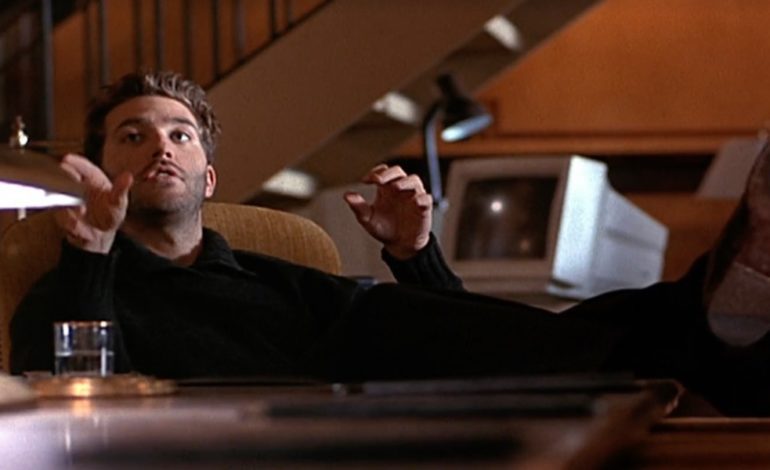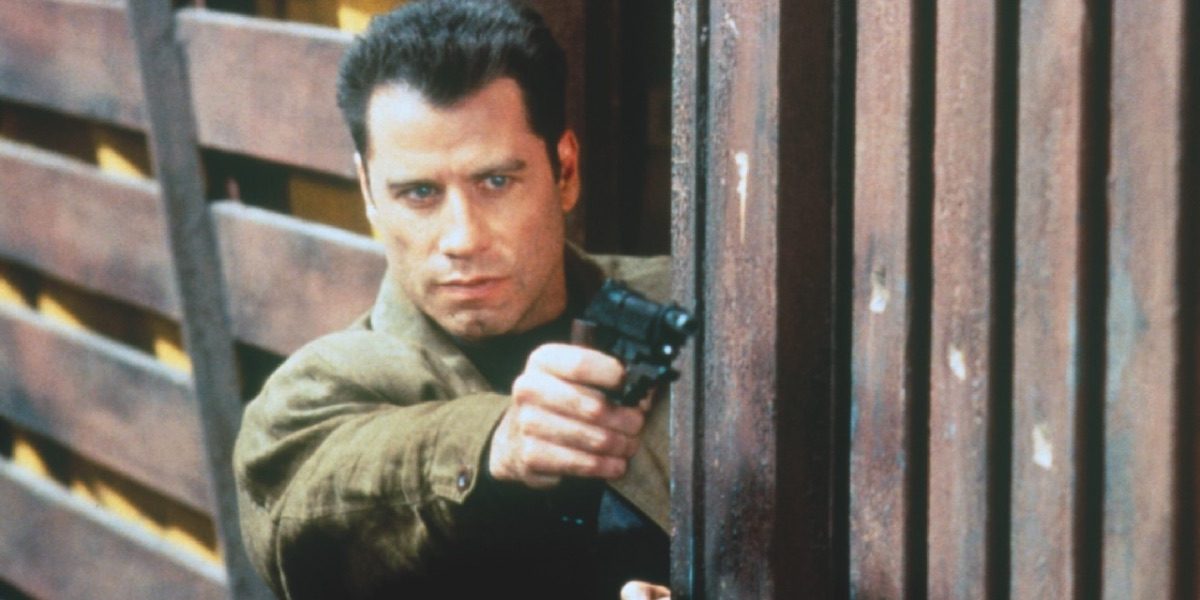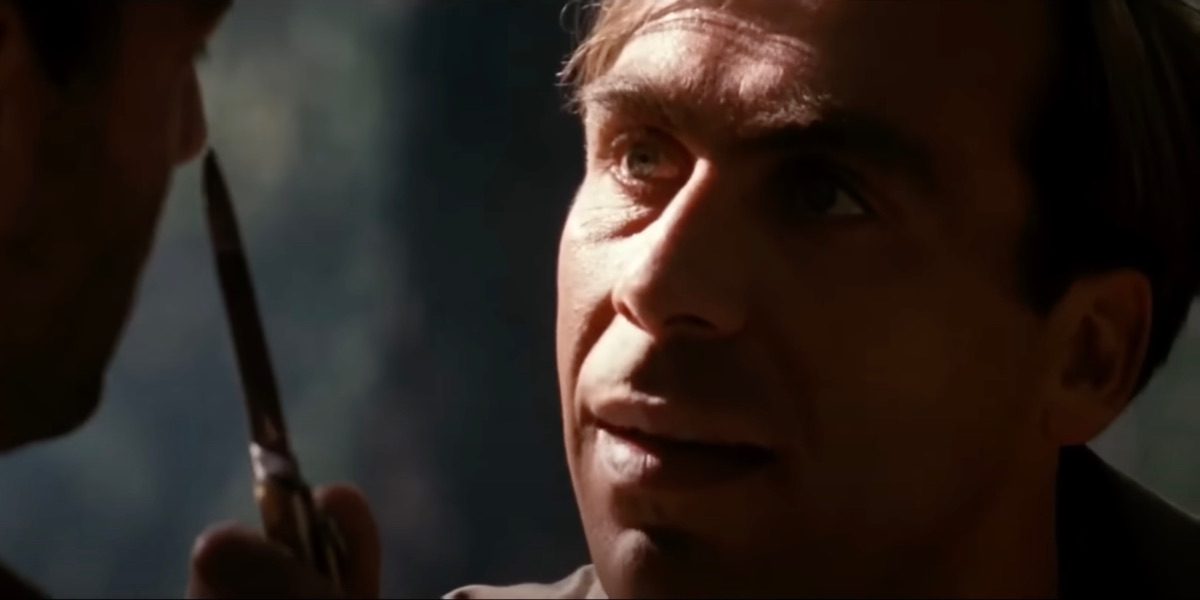

Everyone loves a great villain, and what makes a villain great, much like most things in movies, isn’t always universal across all films. While it’s great to have a deep, well-written villain that has understandable motives, such as a character like Thanos in Avengers: Infinity War, who can elevate a film from great to really great, sometimes it’s fun to have an antagonist who’s just evil and their entire personality can be summed up as “the bad guy”. When it’s done poorly, it can make the character feel incredibly one-dimensional and boring—back to the Marvel comparison, that’s what the early phases of the MCU struggled with for the longest time—but when it’s well executed, whether it be handled by the right filmmaker or performed by the right actor, even if it’s not a ‘deep’ character, it can still make for an entertaining one. Enter Timothy from The Long Kiss Goodnight.
The film that made Shane Black pull a Dave Chappelle and bail from Hollywood for a while and eventually make an epic return—in Chappelle’s case, was his Netflix special, The Age of Spin, and in Black’s case, it was writing and directing Kiss Kiss Bang Bang. The Long Kiss Goodnight was released in 1996 and followed an amnesiac housewife, played by Geena Davis, who, in proper Bourne fashion, discovers that she’s actually a highly-trained spy who has to team up with a private investigator (Samuel L. Jackson) to learn her real identity and eliminate all of the terrorists who are out to get them. If you grew up knowing Geena Davis as Mrs. Little, the film has about the same effect as seeing Jamie Lee Curtis in Trading Places after only knowing her as the mom from Freaky Friday…take that information how you will.
But we’re not here to talk about Geena Davis; we’re here to talk about Timothy, played by the often underrated Craig Bierko, also known as “The Man Who Would Be Chandler Bing” (Google it). Timothy has about as much depth as the area of a public pool with a sign on the ground that says not to dive into it and about as complex as the trivia questions that play on the screen of a movie when you arrive too early, but he has the simple thing that makes so many ‘90s villains so great: a strong passion for what he does.
If, for some reason, you don’t know, the ‘90s was like the golden age of over-the-top and entertaining villains. What was said earlier about complex villains elevating films held true back then as well, but those aren’t the villains we remember the most from that era—an honorable exception for General Hummel in The Rock. You remember Cyrus the Virus in Con Air, M. Bison in Street Fighter, Howard Payne in Speed, whatever John Travolta’s character’s name was in Broken Arrow, and Tim Curry in any role he’s ever been in—his performance as Cardinal Richelieu in The Three Musketeers is next level, and it makes the film better than the things that you like.


For as much as we love the proverbial vegetables of multi-faceted villains who feel like the heroes of their own story and have about as much going on as the protagonists, it’s nice to enjoy the junk food that is a villain who’s evil because they love it. In Broken Arrow, when Christian Slater—we can’t stress enough how little it matters what these characters names are, and you probably can’t even remember either, so we’ll just call him Clarence Worley—when Clarence declares that John Travolta is out of his mind, Phenomenon’s response is, “Yeah! Ain’t it cool?” and you genuinely believe that he’s happy about it.
Timothy from The Long Kiss Goodnight continues that fun ‘90s villain tradition of a man who loves his job and who has no qualms about the ethical nature of what he does. He knows he’s the bad guy and doesn’t care. Again, this simplistic character trope can so easily backfire if not handled well. There are villains who relish being evil in a way that makes them boring. You know the kind. The mustache-twirlers. The ones that kill characters indiscriminately. The ones who are just there to push the story forward so the audience has a face to connect to the hero’s conflicts. Picture Ronan the Accuser from Guardians of the Galaxy if he wasn’t meant to be a stark contrast to the goofiness of the heroes. Villains like Timothy are entertaining because in a weird, off-color way, his badness and lack of morals is oddly cathartic.
When you see bad guys in movies, especially cool villains like in James Bond movies, there’s something oddly alluring about those characters. They’re that dark part of your brain that enjoys going wild in Grand Theft Auto, watching True Crime documentaries, or watching slasher movies. They’re something you can project yourself onto in a controlled and neutral environment where no one actually gets hurt. Villains written by Shane Black are great for that and what they all have in common is a lack of a moral compass and visible enjoyment of what they do for a living.
If there’s one constant that carries some form of truth among most people, it’s that a lot of people don’t care for their jobs. Some people like their jobs, and some love their jobs, but even people with a favorable opinion of their profession still dread their alarm clock going off in the morning. That never seems to be the case with villains in Shane Black movies. We’re not talking about the top bosses who run the show, like Harlan Dexter in Kiss Kiss Bang Bang, Judith Kuttner in The Nice Guys, or Shelly Marcone in The Last Boy Scout. Those are the people in charge and responsible for all the bad things that happen, but their “Number One Guy,” as Carl Grissom in Batman (1989) would put it, are the faces of the organization. Those are the villains that get the most screen time, and they’re the ones who we, as the audience, want to see get what’s coming to them. There’s John Boy in The Nice Guys, Mr. Joshua in Lethal Weapon, Mr. Benedict in The Last Action Hero, and Milo from The Last Boy Scout. The last of which was played by Taylor Negron, another Stuart Little alumnus who you may remember as the super nice toy store clerk who takes pride in his tailor work for action figures and anthropomorphic mice played by actors who’ve also played characters named Milo. (Movies are fun!)


Besides all of them having names that are easy to remember, they all have that flair of guys who take what they do very seriously and do it for the love of the game. None of them have any high-minded perceptions that what they do has to be done for the greater good of the world. Screw the world; they know what they’re doing is wrong—Milo even has a line where he proudly accepts his title as the bad guy—but they’re doing it because it’s their job, and they get some weird perverse pleasure from doing it. All of these guys kill people, most of them abduct the daughters of the protagonist at some point, and every morning, they probably leap out of bed because they’re just so excited to go to work. Scratch that; as far as they’re concerned, they’ve probably never worked a day in their lives. They always go the extra mile, take initiative, and, honestly, they always dress sharp, so they obviously adhere to a self-imposed dress code of some sort.
Timothy is much the same way. While his objective in The Long Kiss Goodnight is to pull off a job to make a bunch of money, his general demeanor makes it appear like that’s just an added bonus. Throughout the film, whenever he’s on the job, shooting at some people and torturing others, he just looks so happy all the time. Credit to Craig Bierko’s performance, it’s not a maniacal, scary type of joy. He’s not Charlie Rakes in Lawless, where the pleasure he takes in doing what he does makes him terrifying. If anything, he looks downright jovial. Half the time you see him, he’s got a full-tooth smile like he’s posing for a senior picture. At one point, when he sneaks up on Samantha/Charlie (Geena Davis) in a helicopter—as everyone knows, helicopters are known for being quiet and discreet—his face lights up when he sees her, and he smiles and waves. He’d probably wave at her with both hands if he weren’t carrying a gun.
As soon as he’s introduced into the film, you understand his personality immediately. His first scene is him torturing this poor guy when he gets interrupted by a phone call, which he answers, but he looks put out for getting distracted from his work. He even mouths “Sorry” to the guy he took a break from torturing, and he doesn’t do it mockingly. He rolls his eyes and has a look of annoyance that would have you believe that he thinks the feeling is mutual. That’s not a freak occurrence, either. Anytime he’s on-screen, he’s cracking jokes, being sarcastic, and having a good time, regardless of what the day calls for. When Samantha/Charlie is about to be interrogated by being dunked in freezing cold water, Timothy puffs out his cheeks as if to say, “Hold your breath”. Then later, when he’s revealing his evil plan and talking about her freezing to death in an industrial-sized freezer, he chatters his teeth as if it wasn’t already made clear that things were going to get really cold. Those little mannerisms give him so much personality, and they feel so uniquely Craig Bierko, who looks like he’s having a blast on set. Also, don’t worry, Geena Davis kills so many nameless goons and then Timothy in spectacular fashion. She’s pretty badass in this.
Timothy and most of Shane Black’s villains are like Syndrome from The Incredibles. It’s not just that they’re pure evil that makes them fun to root against. It’s that self-awareness that they’re the bad guys and are owning up to what’s expected of being in that role. They’re like what Galahad said in Kingsman: The Secret Service about wanting to grow up to be a colorful megalomaniac. They never name-drop other action movies, but considering how pop culture-heavy Shane Black’s scripts are, it wouldn’t be hard to believe those characters are movie buffs who always rooted for the bad guys. In a weird way, Timothy and the rest of the Shane Black Baddie Pack are just a bunch of kids who got their dream job when they grew up. More than that, they’re the literal necessary evil that makes ’90s action movies so fun and rewatchable.
